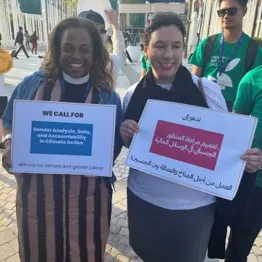This piece is part of an ongoing series focused on the themes of “connection” and “community.” Follow the blog or check our Facebook page to see the other posts in the series as they’re published.
In the ever-evolving narrative of climate justice, there exists a profound intersection with faith. For many, the urgency of protecting our planet stems from deeply held spiritual beliefs that advocate for stewardship of the Earth and compassion for all living beings. Yet, despite the intrinsic connection between faith and environmental advocacy, the journey towards climate justice can often feel like a solitary pilgrimage, fraught with challenges of isolation and doubt. In these moments, it is the power of community collaboration and storytelling that provides both support and inspiration, weaving a tapestry of hope and resilience in the face of isolation and burn out.
At the heart of climate justice lies a profound sense of interconnectedness—a recognition that the health of our planet is interwoven with the well-being of all its inhabitants, present and future. For Presbyterians the call and responsibility to care for creation is clear. Genesis 1:26 reads, "Then God said, Let Us make man in Our image, according to Our likeness; and let them rule over the fish of the sea and over the birds of the sky and over the cattle and over all the earth, and over every creeping thing that creeps on the earth. '" Other faith traditions and indigenous wisdoms lift up similar decrees. Native American Arapaho peoples say, “All plants are our brothers and sisters. They talk to us and if we listen, we can hear them. –“
Yet, despite the clarity of this moral imperative, the path towards climate justice is riddled with obstacles. The enormity of the crisis can often feel overwhelming, leaving individuals feeling powerless in the face of seemingly insurmountable challenges. Moreover, the journey towards advocating for change can be a lonely one, with individuals grappling with feelings of isolation and despair as they confront systemic indifference and resistance from lawmakers.
Amid this struggle lies a glimmer of hope—the power of community collaboration. As people of faith come together, united by a shared commitment to environmental stewardship, they find strength in collective action. Whether through grassroots organizing, interfaith partnerships, or joining forces with secular allies, communities are harnessing the power of collaboration to amplify their voices and effect meaningful change.

COP28 gathered globally to convene on one issue that impacts every human life and the health of our shared planet—the climate. Moreover, COP28 showed me firsthand that at the heart of community collaboration lies the transformative power of storytelling. Across cultures and traditions, storytelling has long served as a vehicle for transmitting wisdom, building empathy, and inspiring action. By sharing personal narratives and collective experiences, individuals forge deeper connections with one another and cultivate a sense of shared purpose.
In the realm of climate justice advocacy, storytelling serves as a powerful tool for mobilization and empowerment. By centering the voices of those most impacted by environmental injustice—whether frontline communities, indigenous peoples, or marginalized populations—stories have the power to humanize the crisis and compel others to action. Through the act of bearing witness to one another's struggles and triumphs, communities find strength in vulnerability and solidarity in shared experience.
I

In conclusion, the journey towards climate justice is a testament to the power of faith, community, and storytelling to effect meaningful change in the world. As individuals come together, bound by a shared commitment to protect our planet and uplift the most vulnerable among us, they embody the transformative potential of collective action. In the words of Mahatma Gandhi, "In a gentle way, you can shake the world." Through faith-inspired advocacy and the power of community collaboration, we can indeed shake the world—and build a future that honors the sacred interconnectedness of all life.
So next time you ask the question “How is the weather today?” when greeting someone, go a little deeper and recognize the ways in which this greeting connects us across geographic boarders and impacts real living. Think of the climate story that has impacted your life. Perhaps you have a story about a hurricane causing coastal flooding, a tornado destroying homes across your town, or excessive heat or cold that makes the outdoors unbearable in a given season. Use this story to unite your community and move toward more just action in caring for creation and advocating systemic environmental change.
Christina Cosby serves as the Associate for Domestic and Environmental Concerns in the Office of Public Witness of the PCUSA.
You may freely reuse and distribute this article in its entirety for non-commercial purposes in any medium. Please include author attribution, photography credits, and a link to the original article. This work is licensed under a Creative Commons Attribution-NonCommercial-NoDeratives 4.0 International License.

